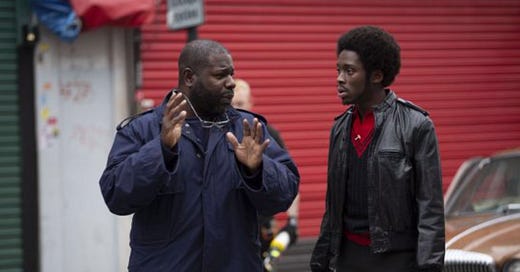FONDAZIONE PRADA PRESENTS THE ITALIAN PREMIERE OF STEVE McQUEEN’S TV SERIES “SMALL AXE” IN MILAN FROM 12 TO 26 JUNE 2022, IN COLLABORATION WITH PIRELLI HANGARBICOCCA
Milan, 26 May 2022 – Fondazione Prada will premiere Steve McQueen’s complete television series Small Axe (2020) to Italian audiences at its Cinema in Milan on Sunday 12 June 2022 and in the following two weekends (18 -19 June and 25 - 26 June 2022). This program results from an unprecedented collaboration with another Milanese art institution, Pirelli HangarBicocca, currently displaying McQueen’s exhibition “Sunshine State” curated by Vicente Todolí and presented until 31 July 2022. The screenings are part of the Public Program devoted to this exhibition. On Sunday 12 June at 7 pm, a conversation between Steve McQueen, who had his first solo show in Italy at Fondazione Prada in 2005, and American film critic Elvis Mitchell will introduce the screening of Lovers Rock, one of the five films comprised in the Small Axe series. Admission to this event is free upon reservation at the website fondazioneprada.org. Access to all other screenings is free upon availability.
The Small Axe anthology series comprises five original films by Academy Award, BAFTA, and Golden Globe-winning filmmaker Steve McQueen (Hunger, Shame, 12 Years A Slave, Widows). It is a Turbine Studios and Lammas Park production in association with EMU Films. Distributed internationally by BBC Studios, the series has not been yet available in Italy. Set from the late 1960s to the mid-1980s, the films each tell a different story involving London’s West Indian community, whose lives have been shaped by their force of will, despite rampant racism and discrimination.
As stated by McQueen, “The seed of Small Axe was sown 11 years ago, soon after my first film, Hunger. Initially, I had conceived of it as a TV series, but as it developed, I realized these stories had to stand alone as original films yet at the same time be part of a collective. After all, Small Axe refers to an African proverb that means together we are strong. The anthology, anchored in the West Indian experience in London, is a celebration of all that community has succeeded in achieving against the odds. To me, it is a love letter to Black resilience, triumph, hope, music, joy and love as well as to friendship and family. Oh, and let's not forget about food too!”.
The Small Axe screenings provide an in-depth look at the practice of an artist and filmmaker who has experimented and innovated in both visual art and cinema over the past 30 years. It is also a fascinating opportunity to analyse his ground-breaking vision’s political and cultural dimensions. The Small Axe collection includes Mangrove; Lovers Rock; Red, White and Blue; Alex Wheatle; Education. Mangrove, co-written by McQueen and writer, director, and producer Alastair Siddons, tells the true story of Frank Crichlow, whose West Indian restaurant becomes the centrepiece in a landmark legal battle against blatant discrimination by Metropolitan Police Force. Co-written with novelist and playwright Courttia Newland, Lovers Rock serves as an ode to the romantic reggae genre and the youth who found freedom in its sound, through the fictional story of young love and music at a Blues party in 1980. Red, White and Blue, also co-written with Newland, centres around Leroy Logan, a young forensic scientist turned police officer in the hopes of transforming the systemically racist Metropolitan Police Department from within. Alex Wheatle, co-written with Siddons, follows the incredible true story of award-winning writer Alex Wheatle, from a young boy through his early adult years. When he is thrown in prison during the Brixton Uprising of 1981, he confronts his past and sees a path to healing. Education, also co-written with Siddons, is the coming-of-age story of 12-year-old Kingsley, a boy with a fascination for astronauts and rockets. When Kingsley is called to the headmaster’s office for disruptive behaviour in class, he is shocked to discover his transfer to a school for those with “special needs.” Distracted by working two jobs, his parents are unaware of what was an unofficial segregation policy at play, preventing many Black children from having the education they deserve until a group of West Indian women take matters into their own hands.
As underlined by McQueen, “All five films take place between the late 60s and mid 80s. They are just as much a comment on the present moment as they were then. Although they are about the past, they are very much concerned with the present. A commentary on where we were, where we are and where we want to go.”
in case you missed…




